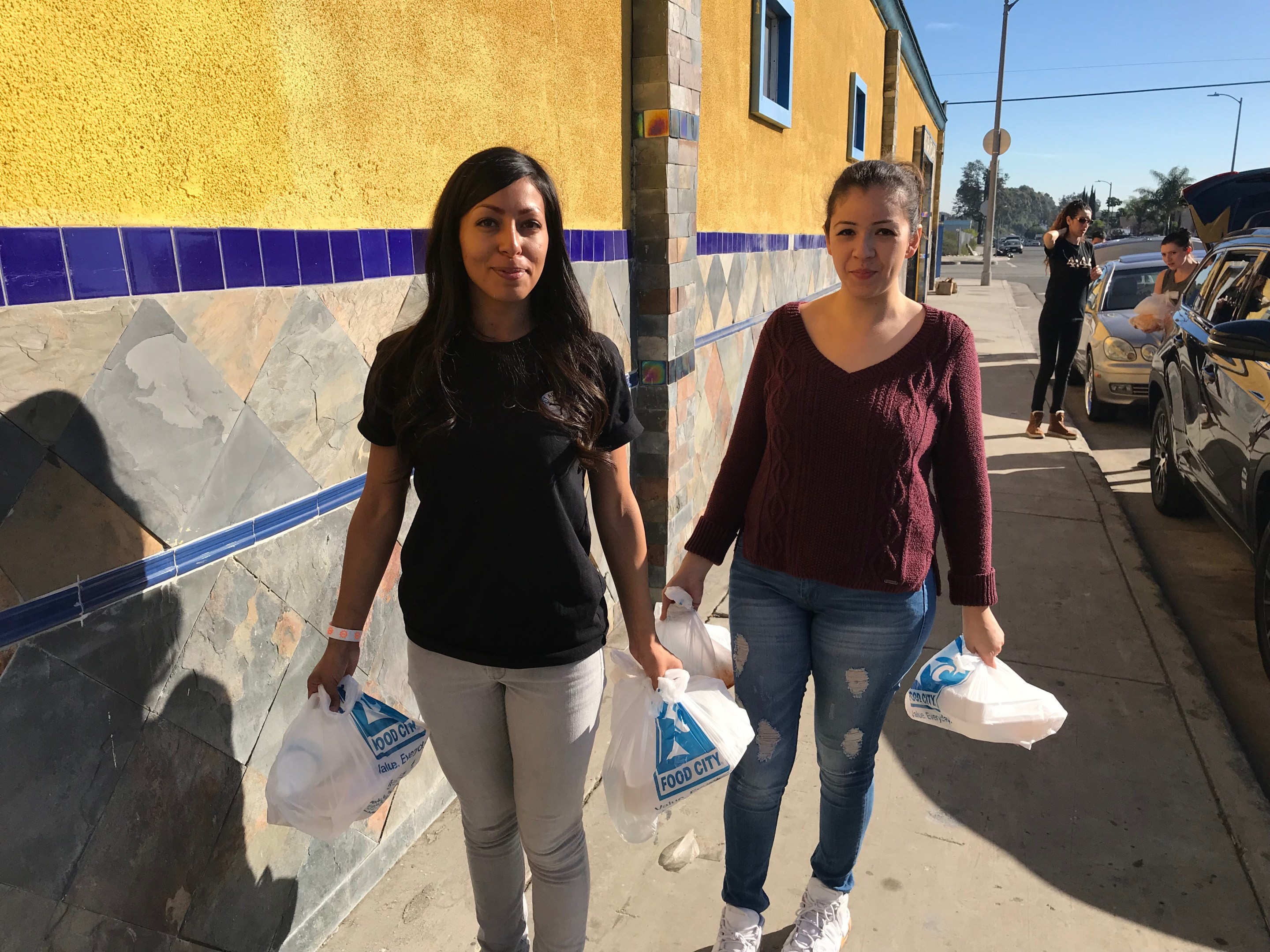[dropcap size=big]O[/dropcap]n a Sunday morning in late January around the intersection of Grand Avenue and 69th Street, we arrived at an encampment next to a chain link fence of over a dozen tents, several parked camper vans, and other vehicles with people living in them. Just east of the 110 Freeway and across the street from some small well-kept craftsmen cottages, this tent city is merely one of over 220 plus similar sites across Los Angeles. I was here this morning with a group of nine young activists that feed homeless people every month called, Feed South Central, known as F.S.C. for short.
This southern stretch of Grand is the polar opposite of 10 miles north along Grand in Bunker Hill where sites like the Museum of Contemporary Art, the Disney Concert Hall, Broad Museum, and the Dorothy Chandler Pavilion stand as the cluster of buildings the city calls the “Grand Avenue Cultural Corridor.” These two opposite sides of Grand Avenue epitomize the paradox of Los Angeles in 2018.
On this specific morning, nine volunteers from Feed South Central gave out plates of food to two dozen folks in the immediate area. Their generosity was warmly received.
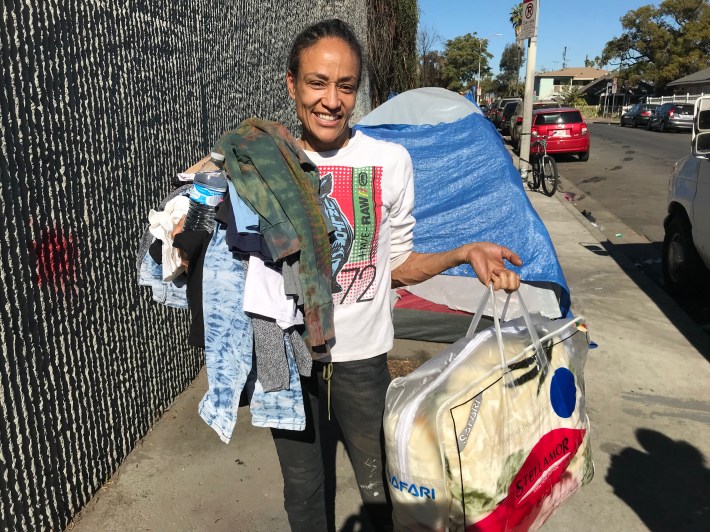
According to a February 2018 article in the Los Angeles Times, homelessness has surged 75 percent in the last six years across Los Angeles from about 32,000 to roughly 55,000. The reporter Gale Holland also writes that, “If you took out Los Angeles, national homelessness would have dropped last year for the first time since the recession.” Obviously, many economic factors contribute to this, but the conditions are especially exacerbated by the local housing shortage and the fact that compared to other metropolises, L.A. is near the bottom in sheltering homeless.
This alarming rise has energized Feed South Central into direct action.
FSC is an organization that does exactly what’s its name implies. Started by 27-year old Jazmin Gonzalez, their team of volunteers goes out one Sunday a month and feeds homeless people across South Central. A few months after Gonzalez got started, she met Emma Cortez. They immediately joined forces because of a mutual interest in social justice.
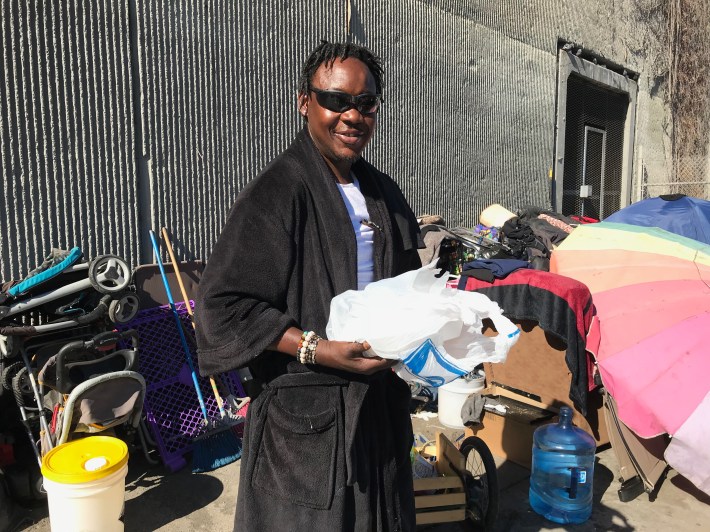
Both Gonzalez and Cortez are 27 with full-time jobs and full-time students. Gonzalez is an English major at Cal State Dominguez Hills and works as a writer and editor at The LGBT Sentinel, a Hollywood-based newspaper. Cortez is a Political Science major at UCLA and she works at L.A.U.S.D. I spent five hours with them a few Sundays ago as they made eight separate stops and fed over 100 people.
Give What You Can
Beginning at 9 a.m. at Green Meadows Park on San Pedro and 89th Street, Gonzalez and Cortez are accompanied by seven other volunteers who assist in bagging and plating pasta, garlic bread, oranges and bottled water in small care packages. Serendipitously, a nearby car parked a few spaces away, not connected with Feed South Central plays “Stand By Me,” and the F.S.C.’s streamlined teamwork embodied the spirit of the song. The song’s chorus echoed across the parking lot:
“If the sky that we look upon / Should tumble and fall / Or the mountain should crumble to the sea / I won't cry, I won't cry / No, I won't shed a tear / Just as long as you stand / Stand by me.”
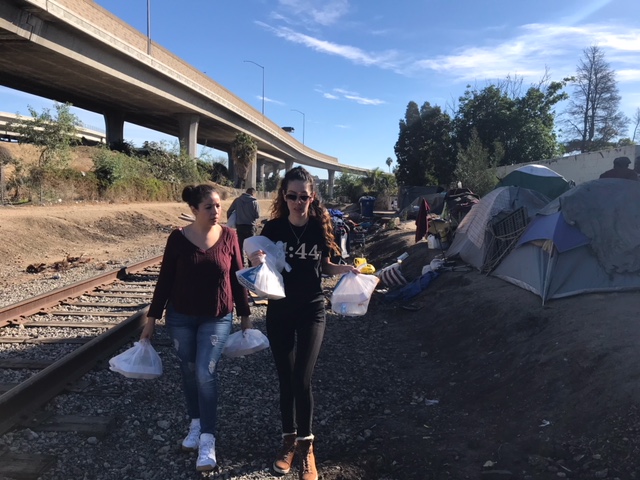
Standing next to one another, each volunteer wears plastic gloves and they operate in an assembly line, creating about 100 individual plates each bagged separately. In less than 30 minutes, the plating was finished and then loaded into the back of the three cars. By 9:30 a.m., they were ready to hit the streets.
“I don’t like this call out culture that forgets to propose solutions...”
A spirit of friendship was in the air. Bystanders observing their coordinated efforts always ask them what church they are with, but Gonzalez tells them that they are not with any church; they are simply a group of committed residents that meet up one Sunday a month to Feed South Central.
F.S.C. began two years ago. They receive donations from local organizations, churches, schools and anyone else that wants to help. They hold off on monetary donations and instead list ingredients online and the type of items needed. The amount of food they give away each month depends on how many donations they get. They have given away sandwiches, tamales, pasta, chicken soup, clothing items, feminine products and other miscellaneous items. On one occasion they were able to make over 150 plates. They have also given away items like jerseys and blankets when they are donated.
Gonzalez made her first official F.S.C. drive on Sunday, January 31, 2016. She remembers the first run: “I bought what I could afford, my good friend Sonia Gonzalez came over and we prepared everything. By the time we were done, it was dark and super cold. I thought about postponing it, but then it dawned on me: If I was cold indoors — they must be freezing out there! We loaded everything up and started driving randomly around the streets of South Central L.A. until we ran out of food.”
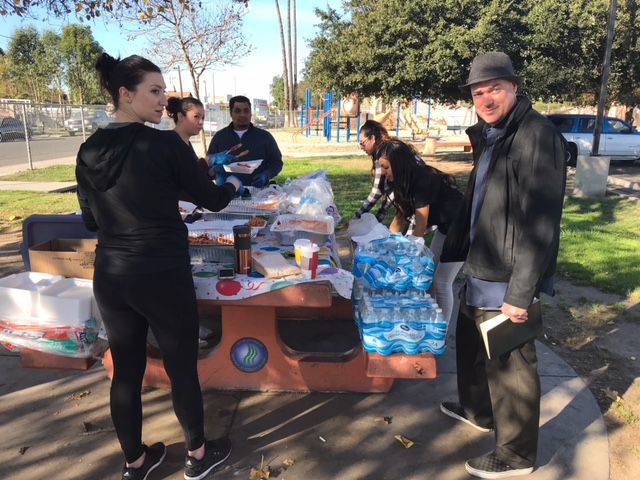
Gonzalez tells me that one of the main reasons she started F.S.C., besides the obvious rise in homelessness is that she wants to be the change. “I don’t like this call out culture that forgets to propose solutions,” she says. She originally started by feeding one person a day but then she started to feel like it was not enough. It was a culmination of many ideas, Gonzalez confesses, “that, while OK at best, didn’t have long-term success. I was originally inspired by the Ice Bucket challenge that went viral back in 2014, and lunch walks organized by a community collective called Hijas De La Paz.”
“I was raised to help those in need, I didn’t realize that was activism until well into adulthood,” she says. Gonzalez is so prolific that it seems like she never sleeps. In addition to being a full-time student and her full-time job writing and editing at The LGBT Sentinel, she also blogs and writes very thought-provoking essays that are published on multiple platforms.
“'Urban planners and policymakers spend lots of time talking about, theorizing, debating, and troubleshooting problems and solutions ad nauseam,' but never really making a difference."
Cortez is equally busy in her efforts as a mother, full-time employee and UCLA student. Cortez explains how it all connects: “As a Political Science student,” she says, “we study a lot of theory. Well, my work with Feed South Central has allowed me to move from theory to action.”
Direct Action
I learned about Feed South Central last year from L.A. County Urban Planner Jonathan P. Bell. Bell found them on Instagram in early 2016 and they instantly connected because of their common missions. Bell explains, “I’m trained as a hybrid urban planner and librarian. I understand the value of building community networks both on-the-ground and online. As an Embedded Planner, I’m out in South Central L.A. daily, bringing together allies and connecting people. But I’m also organizing online – the 21st public space where activists come together.”
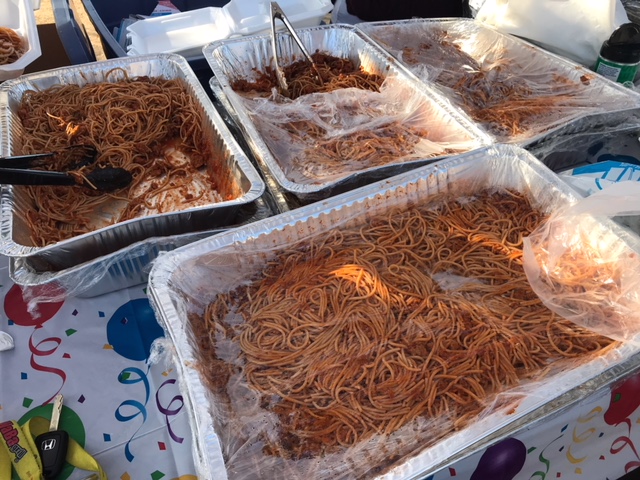
Bell has worked as an Urban Planner across South Central Los Angeles for the last 11 years and he was inspired by their mission. Never one to be a desk worker, he loves to be out in the field. He began meeting up with Gonzalez and Cortez and donating what he could. He immediately felt, “Their work is brilliant in its straightforwardness. Concerned community members saw a concern: unhoused neighbors going hungry in our city streets. In response, they devised a workable solution: make and deliver home-cooked meals to unhoused people. It all sounds so simple until you realize that this is a sharp departure from the norm regarding services for people experiencing homelessness.”
Their approach was refreshing to Bell because he has witnessed “Urban planners and policymakers spend lots of time talking about, theorizing, debating, and troubleshooting problems and solutions ad nauseam,” but never really making a difference. Their effectiveness impressed Bell. “Feed South Central sidestepped the entrenched bureaucracy,” Bell effuses, “because that’s what was needed to get this done.”
“In planner vernacular, they’ve gone straight to implementation, that all-important facet of city planning that matters most because it has a direct bearing on people’s lives,” Bell says. “Lead organizers Jazmin Gonzalez and Emma Cortez, and the dedicated group of Feed South Central volunteers feed and clothe unhoused people monthly because that’s just what needs to be done. Their approach is instructive for planners and policymakers: sometimes you just have to find a way!”
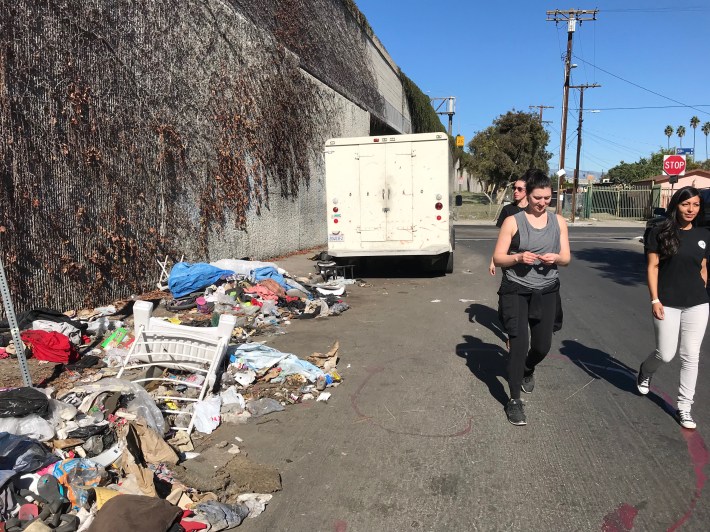
Bell is accurate. On the day I was with them, Jazmin Gonzalez was wearing a shirt that said: “Direct Action Division.” Her behavior matched the shirt to a T. I witnessed her, again and again, walking up to encampment after encampment and handing off plates of food.
“Many times, Jazmin and I have gone back home crying, feeling so helpless as we ran out of food...”
In addition to plates of food, some of the F.S.C. team gave clothes, blankets, and hygienic products like toilet paper and baby wipes. Over the course of eight stops, they gave about 10 to 15 plates at each site, sometimes more like at Grand and 69th. Several of the stops were along the 110 freeway and under the various bridges next to it.
Preserving Dignity
The distribution began that morning near the 105 and 110 freeway interchange. Just south of the main junction, an encampment of nearly a dozen tents lies along the freeway. With no hesitation, Gonzalez boldly walked into their camp with plates of food in hand. Joined by Cortez and others, they begin handing out plates. During the process of handing out the provisions, they take time to talk with the people they meet. “We create friendships,” Cortez says. “We stop and talk to them. We ask how their day has been. We learn a lot from them, from their wisdom and stories of survival. And the smiles they give us, those smiles are priceless.”
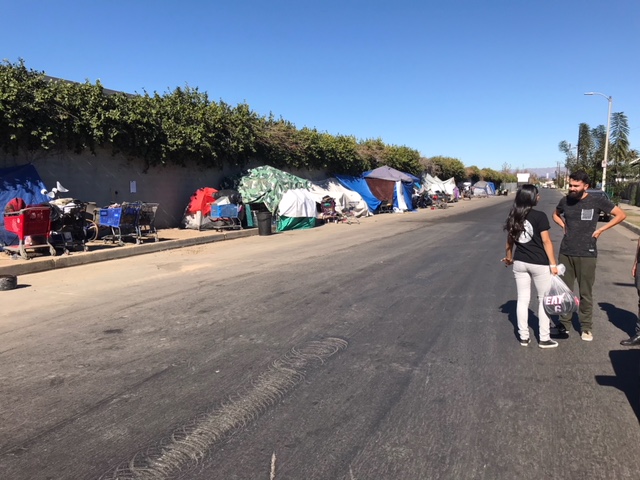
Gonzalez concludes, “We always give them a few minutes to speak and tell their story.” They are always very respectful. In addition to witnessing many smiles throughout the morning, at one of the stops along Grand and Slauson, I saw a man that got a plate warmly give them a watercolor painting he just completed.
F.S.C. takes pictures of the people who receive the food, but not as a way of celebrating their generosity. “We take photos,” Gonzalez shares, “so that those who donate to us know that we are doing what we say we are.” Another key point about taking the photos, she adds, “is to always preserve the dignity and self-respect of the people we feed.”
When some deny the request to have a photo taken, they do not mind. Gonzalez is concerned about feeding them not about receiving praise or credit. Still, she tries “to be very transparent on social media.” She mentions on more than one occasion throughout the day that their efforts are not to get attention or to be trendy and therefore she detests the word “activist.”
“I think naming it,” she states, “rather than living it as the only normal, is what’s wrong with the world.”
Nonetheless, they still wish they could do more. Cortez reflects on the emotional element of it all. “Many times, Jazmin and I have gone back home crying, feeling so helpless as we ran out of food,” Cortez confesses. “We’ve gone back home shaken by the stories of violence some of those people have endured. Many times, we have been triggered by the very own traumas we have experienced. We literally understand their troubles, their frustration, we feel their pain. This project has helped us connect to our community on a deeper level.”
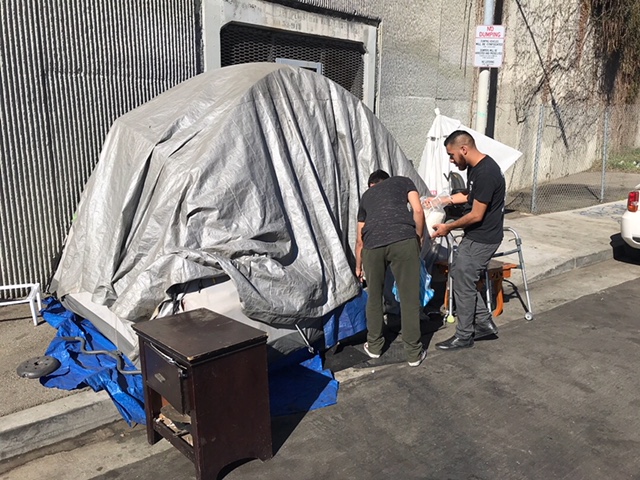
Walking the Walk
Gonzalez and Cortez walk the walk in all regards. They believe in supporting local small businesses and always buy their oranges and other produce from local vendors. Cortez adds, “I have realized that in the political environment in which we find ourselves, the simple act of feeding our neighbors has become an act of resistance.”
“Women of color are leading the change we see today."
Over the last two years, they have had a lot of volunteers join their efforts. People from across L.A., the Inland Empire, Orange County and even some people visiting from Australia have joined them on Sundays over the last two years. “It’s a communal effort,” Gonzalez says. “Our moms even help us sometimes.” Cortez’s boyfriend also helps. His name is Rogelio Zambrano and in addition to helping the F.S.C. team, he works for the IT Department at LAUSD where helps distributes hotspots and laptops to homeless youth so that they can have internet access and complete school work. Zambrano sees his work with the homeless youth in a similar light to F.S.C. and he tells me he tries to give wherever he is whether it is on the clock or volunteering with Cortez and Gonzalez.
The volunteers are the heart and soul of F.S.C. Gonzalez names their most consistent participants: “Emma Cortez (who is also my right-hand woman and V.P.), Cinthia Rodarte, Ivone Cruz, Berenice Morales, Rigo Brito, Jonathan Padilla, and Renee Moleda — just to name a few. There are also folks like Manon Manouvre, Carey More, Camilla More, Juan Perez, Jason Perez, and Jonathan Bell whom month after month make donations and help us spread the word.” They also have companies like Philadelphia Printworks, The LGBT Sentinel, NayNay’s Tacos, Community Nest Foundation, and KIPP Schools supporting their movement.
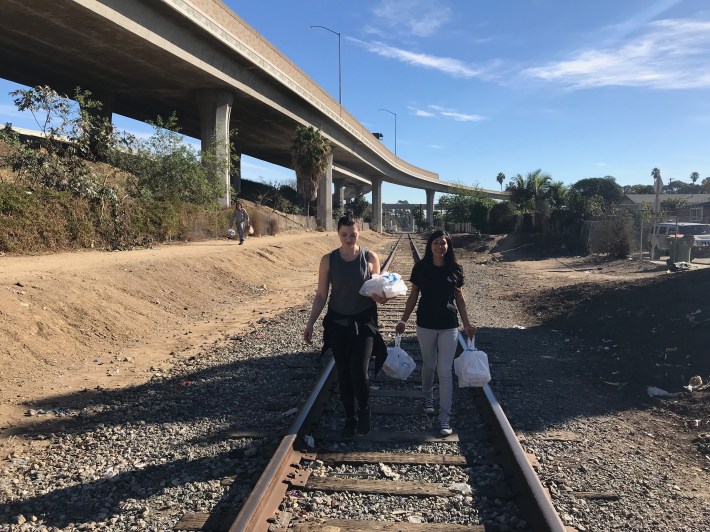
“I’ve been pleasantly surprised by the overwhelming support F.S.C. has received,” Gonzalez exclaims. “I’ve been surprised by the optimism some folks have despite their circumstances. I’ve been surprised by the number of folks that are employed but can’t afford a proper living situation. I’ve been surprised by the wide array of occupations, and circumstances then can lead to the same fate. I’m surprised more than anything though, by the number of people that can just look the other way.”
Despite it all, Cortez says, “this project has brought us so many blessings. From reuniting us with old friends, to meeting new beautiful and kind-hearted people who are dedicated to making a change in our community.”
These combined factors lead Feed South Central to work even harder. They are on the path to becoming an official nonprofit. “As soon as that becomes our reality,” Gonzalez says “we plan to emulate the program in other neighborhoods, with the help of local leaders. Our funding will grow, our reach will grow, our community will grow and together we will change the world as we know it.”
Nourishing the Body and the Soul
The late great Urban Planner and UCLA Professor Edward Soja wrote in his final book, My Los Angeles in 2013 about the rise of grassroots activism in Los Angeles over the last 50 years. Soja especially lauded “the emergence into leadership positions of radical women of color.” Soja mentored Jonathan P. Bell when Bell studied Urban Planning with Soja at UCLA 15 years ago and Bell reiterates his mentor’s sentiments: “Women of color are leading the change we see today,” Bell exhorts. “Jazmin and Emma exemplify it in their direct-action activism to feed and clothe unhoused neighbors. They share the core leadership qualities suited for this work. They’re fearless, passionate, empathetic, dedicated, driven, strategic, and solutions-oriented.”
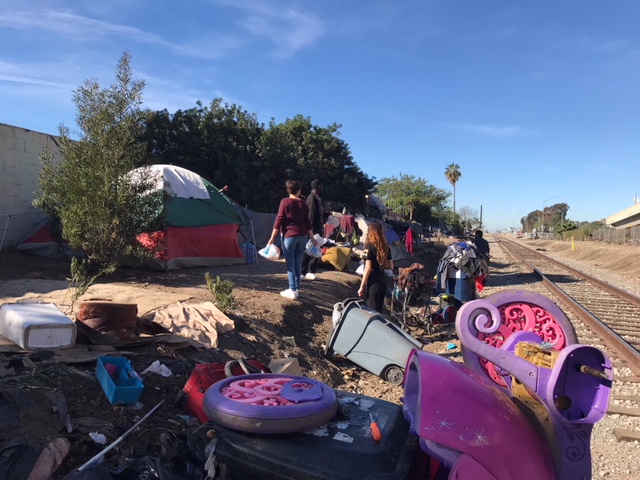
The efforts of Feed South Central show what happens when enough people care and join to make a difference. Ultimately, Feed South Central’s humanism brings it back to core human qualities like generosity, companionship, and compassion. “You don’t need to have a dime to your name to make a difference,” Gonzalez states. “Volunteering is free and so is human interaction — that nourishes people, too.”
Feed South Central’s direct-action program not only offers a model to emulate, they nourish the body and the soul. In every way, they Feed South Central.
